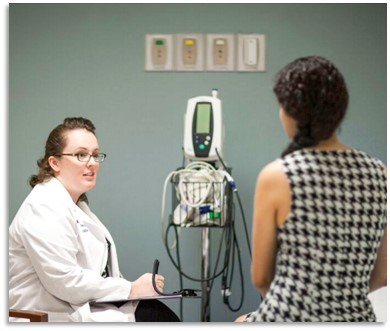
CHICAGO, IL (February 26, 2019) — A new $950,000 grant awarded to Swedish Covenant Hospital will enable the health care provider to expand a program that has been successful in helping staff to recognize undetected signs that someone has been a victim of domestic violence, sexual abuse, or human trafficking.
The hospital is one of only eight organizations nationwide to receive a two-year grant from the Department of Justice to help hospital-based victim services. The grant will make it possible for SCH to provide additional training, more advanced evidence-gathering equipment, specialized nursing, and expanded connections with community partners.
The Violence Prevention Program launched in 2015 and has trained 1,500 medical and non-medical staff. Since then, they have treated and provided assistance to more than 750 victims of domestic violence, 275 people of whom have suffered sexual assault and 50 individuals who had been trafficked, said Kate Lawler, program director. Many did not initially present themselves as abuse cases.
“We know that survivors of these forms of violence are often hesitant to seek medical and mental health care for fear they will not be understood,” said Lawler. “We are building this program on the wisdom of survivors who know best how a health care system can make them feel welcome, safe, and supported.”
Many hospitals can provide immediate assistance to victims of abuse and trafficking, but don’t typically offer coordinated comprehensive care, Lawler said.
The hospital setting provides a unique opportunity for helping people escape abuse. “The healthcare provider may be the only person who can see the trafficked person alone,” Lawler explained.
Having a staff that is broadly multiethnic and trained to spot possible instances of abuse has proven valuable, Lawler said. “Patients can sometimes feel more open to sharing information with a healthcare provider or perhaps an employee of the same ethnic or cultural background.”
We want to make sure everyone can get all the help they need.
Typically hospital staff tend to look only at physical injuries to determine whether someone has been abused, but other behavioral signs may be detected by trained staff. For example, an abusive partner may insist on being with the patient at all times or insist on being the one who fills out all medical forms, Lawler said.
Some illnesses also could be a sign. One 35-year-old woman told her doctor during her annual physical that she had been experiencing dizziness and insomnia. The physician had been trained to ask questions in a way that engendered more trust so that the patient felt free enough to share that “My husband is becoming more and more controlling and I don’t know what to do.”
The physician was able to connect the patient with someone who could help her access comprehensive services at the time of crisis as well as afterward.
The new grant also will help the hospital train a pool of nurses to qualify as Sexual Assault Nurse Examiners (SANE), who provide specialized care and gather evidence in a way that doesn’t add to a victim’s trauma, Lawler said. A new Illinois law requires that a SANE nurse connect with a victim within 90 minutes of arriving at the hospital. “We’re creating a pool of nurses who can meet those requirements.”
The hospital partners with local victim advocacy organization to have someone onsite 20 hours a week and provide tele-health access 24 hours a day. The VPP also connects individuals with long-term services such as housing and economic empowerment programs, legal services, and counseling.
Those partner programs also make referrals where victims can receive ongoing medical care, Lawler said. “We know that a lot of people who experience these kinds of violence have difficulty navigating the healthcare system because they may have insurance in the name of the person who is hurting them or because of their immigration status.”
“We want to make sure everyone can get all the help they need,” Lawler said.












